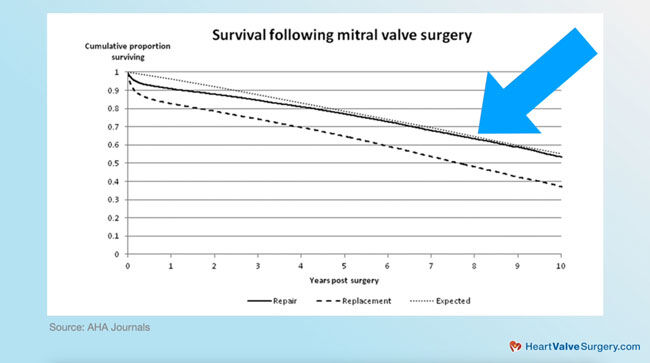Heart Valve Surgery: Top 5 Facts for Newly Diagnosed Patients
Written By: Allison DeMajistre, BSN, RN, CCRN
Medical Expert: Dr. Marc Gerdisch, Chief of Cardiac Surgery, Franciscan Health
Reviewed By: Adam Pick, Patient Advocate
Published: October 4, 2023
The number of Americans with heart valve disease is about 2.5% and rising. In fact, the prevalence of heart valve disease is expected to double by 2040 and triple by 2060. The good news is there are effective treatment options for heart valve disease. With early detection and appropriate medical care, patients experience significant symptom relief and improved quality of life.
Still, a new diagnosis can be overwhelming for patients and their families. The only way to ease worry and fear is by getting the best and most up-to-date information from a specialist with decades of experience. We recently spoke with Dr. Marc Gerdisch, Chief of Cardiothoracic Surgery at Franciscan Health in Indianapolis, Indiana, to discover the “top 5 facts” he believes newly diagnosed heart valve patients need to know to help them understand the next steps and what to expect. Fyi, Dr. Gerdisch has performed over 6,000 cardiac procedures including 4,000 heart valve operations.
Dr. Gerdisch understands the intense anxiety and fear patients and families experience during their first meeting with him. That’s why he likes to discuss the top 5 most important facts to know and understand before deciding on treatment options.
Fact 1: What Are The Risks?
The first thing Dr. Gerdisch talks about is risk. “We have data that allows us to estimate risk for patients,” Dr. Gerdisch told us. “Patients recognize is that it’s very safe and that we’ve refined techniques to the point where people do very well,” Dr. Gerdisch tells us.
Fact 2: How Effective Is Treatment?
Dr. Gerdisch focuses on the efficacy of treatment next. “Can we fix the problem? The truth is, yes,” he said. He believes he can identify exactly how to effectively resolve each problem most patients present with after their initial diagnosis.
 Life Expectancy for Mitral Valve Surgery (AHA Journals)
Life Expectancy for Mitral Valve Surgery (AHA Journals)
Fact 3: Life Expectancy Insights
Dr. Gerdisch understands how important it is for patients to know whether they can have the life they had planned for and expected. “Certainly, in valve repair, we find out we can generally restore people to nearly normal life,” he told us. “And with valve replacement, by choosing the right device, we optimize the likelihood of them living long and well.”
Fact 4: Understanding Enhanced Patient Recovery
“The fourth thing that I talk about because it’s something we do, but also I think all patients should be aware of, is enhanced recovery,” Dr. Gerdisch said. He believes patients must know and understand that the entire process starts even before their procedure and continues during their hospitalization and afterward during enhanced recovery. “The reduction in pain, the enhanced mobility, the return to full activity, including full mobility, I think, patients need to know about and ask about.”
Here is a video describing the Rapid Recovery Protocol 2.0 developed by Dr. Gerdisch and his team at Franciscan Health.
Fact 5: Addressing and Treating All The Issues
The last thing Dr. Gerdisch covers is other disorders in a patient’s heart that they may not even be aware of. “For example, atrial fibrillation or a leak in the tricuspid valve when they’re there for a leaking mitral valve, we like to cover all that.” He believes patients should know that all those issues will be addressed and treated during heart valve surgery.
Thanks Dr. Gerdisch and Franciscan Health!
On behalf of our patient community, many thanks to Dr. Gerdisch for sharing his experience and expertise about the top 5 facts newly diagnosed heart valve patients need to know. We also need to thank the entire Franciscan Health team for caring for ALL our heart valve patients, newly diagnosed and those who have already received treatment!
Related Links:
Video Transcript:
When I first meet a patient, they’re usually pretty anxious, they and their family. There are five things that I really like them to know or understand. My name is Marc Gerdisch. I’m chief of Cardiothoracic Surgery at Franciscan Health in Indianapolis, Indiana.
The first thing I like to talk about is risk. We have data that allows us to estimate risk for patients. Mostly, what they recognize is that it’s very safe and that we’ve refined the techniques to the point where people do very well.
The second thing I’ll usually discuss is efficacy. Can we fix the problem? The truth is yes, the vast majority of patients that present to us, we’re able to identify exactly what we need to do and accomplish resolution of their problem.
The third topic that we often talk about is life expectancy. People want to understand if they’re going to get to live up their life the way they had planned and expected. At heart valve disease, we have achieved a great deal with respect to that. Certainly, in valve repair, we find out we can generally restore people to nearly normal life curve. Also with valve replacement, by choosing the right device, by planning out the patient’s life, then we optimize the likelihood of them living long and well.
The fourth thing that I talk about because it’s something that we do, but also I think all patients should be aware of, is enhanced recovery. The entire process from before, during their hospitalization and afterward through enhanced recovery, the reduction in pain, the enhanced mobility, the return to full activity including full mobility. I think patients need to know about it and ask about it.
The last thing that I like to cover with patients, sometimes they’re not even aware. Sometimes they only have a hint of it. There are concomitant disorders, other things that are going on with the patient’s heart. For example, atrial fibrillation or a leak in the tricuspid valve when they’re there for a leaking mitral valve. We like to cover all of that and to be sure that we’re addressing all of those issues while they’re there because if there is a problem that should be treated, it should be treated at the time that they’re having the surgery.




